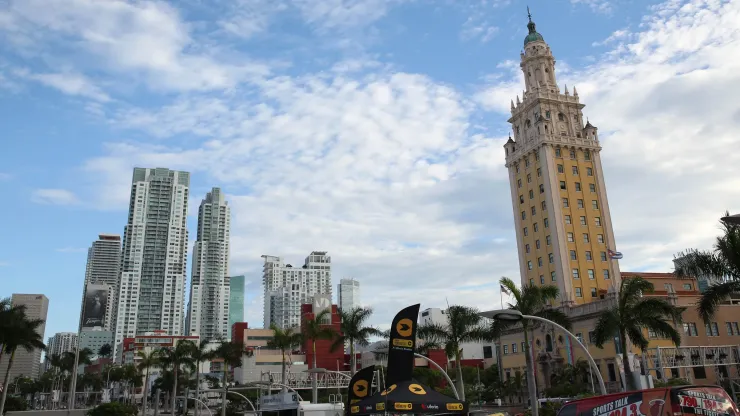The time has come for MLS to pull the plug on the Miami debacle. The league, which has begun its 20th season in a strong position, now has the ability to pick and choose expansion markets. David Beckham’s commitment to Miami and to MLS is admirable, but the market is too fraught with risk at a time when other geographic locations represent an almost sure thing.
Florida is the third most populated state in the union and the launch of Orlando City SC in MLS, following the club’s successful minor league run, reinforces the potential of both the Florida market and bringing teams from the minor leagues up to the majors.
On that score, the decision to double-down and try and secure a solution in Miami is bewildering. This week, Minnesota United FC, a minor league club, announced they are in discussions with Major League Soccer to move to the top division in the near future. Minnesota has had a professional soccer team for more continuous seasons than any other American market (Minnesota United will begin the 26th consecutive season of pro soccer in the Twin Cities next month).
Miami, however, has no such infrastructure in place. Fort Lauderdale Strikers, the current local pro soccer club, has weak ownership and are sparsely supported. The club’s managing partner even mocked David Beckham in an October 3 Reditt conversation with fans. Ricardo Geromel said “If the underwear model is able to put a team together, it would be a pleasure to face them on the pitch.” Thus any thought of a Beckham-Strikers partnership is a moot point.
Sacramento has followed the Orlando model with a minor league team that was well supported and the engagement of local elected officials. The California capital city would be a worthy addition to MLS as it would provide a seventh Pacific coast team for the league, creating even more local rivalries.
On the subject of local rivalries, internet buzz has begun to circulate about the Tampa Bay Rowdies and the potential of the minor club who shares the name of one of the great professional clubs of a previous era in American soccer to move to MLS.
It is important to note while arguments can be made for Miami as an MLS franchise, the Tampa/St Petersburg TV market is actually larger than Miami/Fort Lauderdale. It is also critical to note that between 1975 and 2014, the Tampa Bay area and Miami/Fort Lauderdale areas have had pro teams in the same soccer leagues for 23 seasons. In that period only three times did the southeast Florida team boast higher attendance than the Tampa Bay-based one. This includes four seasons in Major League Soccer (1998-2001), where Tampa Bay led Miami in attendance three of the years, and nine seasons in the NASL (1975-1983) when Tampa Bay led Miami or Fort Lauderdale every single season.
Miami is more of a global branding opportunity than a soccer-crazed market. Major League Soccer has survived for years without a Miami team, and now is thriving despite the debacle taking place under the palm trees in southern Florida. While I, as a local, would like to see MLS return to southeast Florida, the club in Orlando is close enough to me that my need for MLS in Miami has been minimized. Furthermore, it is important that the health of MLS and US Soccer be considered – MLS does not need another Chivas USA debacle or a club limping along in a huge metropolitan area without any real tangible market penetration like the Chicago Fire. Chances are quite high that a Miami team would represent either another Chivas or Chicago, and either scenario is unacceptable for MLS and the health of the game in the United States.
While the Tampa Bay market “failed” once before in MLS, that was a different time. A fear about cannibalization of the audience from Orlando which is nearby could be real, but the rivalry implications (Orlando City and the Tampa Bay Rowdies already have a robust rivalry fostered at the lower-division and US Open Cup level) probably offset those concerns. A “war on I-4” rivalry would be far bigger for MLS then an organic club like Orlando City battling a manufactured and largely plastic club like Beckham’s Miami entry promises to be.
Sacramento is an even surer bet than Tampa Bay or Miami would be. An adolescent metropolitan area trying to escape the shadows of larger and more glamorous in-state locales, Sacramento has a healthy combination of Orlando, Columbus and Portland in it. Most logical and objective people would look at these elements that present in California’s capital city and opt for it in a heartbeat over Miami. My sense is many in MLS would as well, but commitment to David Beckham is precluding it from happening.
The end game might be to let this play out for another few months and then MLS can say “we gave Miami a shot, we wanted to be there, but it wasn’t feasible,” and simply move on. That would be the best deal for everyone involved in soccer in this country and those who want to see MLS continue to thrive.
200+ Channels With Sports & News
- Starting price: $33/mo. for fubo Latino Package
- Watch Premier League, Women’s World Cup, Euro 2024 & Gold Cup
The New Home of MLS
- Price: $14.99/mo. for MLS Season Pass
- Watch every MLS game including playoffs & Leagues Cup
Many Sports & ESPN Originals
- Price: $10.99/mo. (or get ESPN+, Hulu & Disney+ for $14.99/mo.)
- Features Bundesliga, LaLiga, Championship, & FA Cup
2,000+ soccer games per year
- Price: $5.99/mo
- Features Champions League, Serie A, Europa League & Brasileirāo
175 Premier League Games & PL TV
- Starting price: $5.99/mo. for Peacock Premium
- Watch 175 exclusive EPL games per season






